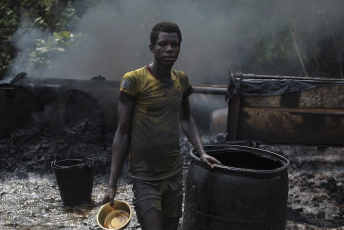Sierra Leonean migrants seeking better lives abroad are increasingly caught in a web of forced labour masked as work-abroad programmes in the Middle East.
Fake recruitment agents and trafficking networks exploit the high-risk appetite of young Sierra Leoneans facing unemployment, poverty and the effects of climate change.
Constituting 74.5% of the population, Sierra Leone’s youth are disproportionately affected by the country’s chronic economic challenges – two-thirds do not have meaningful employment.
Women are also particularly vulnerable to exploitative Middle East recruitment programmes, according to Chelcy Heroe, Founder and CEO of the Informal Workers Organisation in Sierra Leone, who spoke to ENACT. In 2020, Senegalese law enforcement arrested a human smuggling ring of Sierra Leonean and Senegalese agents who specialised in trafficking young women from Sierra Leone to the Middle East. They were harbouring 87 Sierra Leonean women in Dakar during their protracted journey.
Across the country, unregistered agents recruit desperate young people and women for exploitative employers in the Middle East. The subtle roles played by these agents blur the lines between migrant smuggling and human trafficking. They reportedly cooperate with both smuggling and trafficking networks in transit points in West and North Africa, and in destination countries in the Middle East.
The agents use posters and social media platforms such as Facebook and TikTok to promise well-paid jobs as nannies, hairdressers, maids, teachers, shop assistants and workers in the construction and hospitality sectors in the Middle East. They tout Middle Eastern countries – such as Lebanon, Oman, Kuwait and Saudi Arabia – as the new frontiers for work opportunities.
The agents illegally demand between US$600 and US$1 000 from migrants – for recruitment fees, forging documents and facilitating the journey – in contravention of the International Labour Organization’s Private Employment Agencies Convention (1997). A 23-year-old woman who returned from Lebanon told ENACT that she had to sell family possessions and land to raise funds to travel to Lebanon. Other migrants have stolen or borrowed money, making it difficult for them to return home lest they are seen as failures or are punished.
For fake agents who also act as migrant smugglers, ‘mixed’ travel arrangements have been devised over the years, involving land transport to neighbouring countries before air transport to the Middle East. The agents have three major reasons for using a mixed travel approach for this difficult journey – which the youth commonly call the ‘Temple Run’, referring to a video game where players navigate obstacles and difficulties for end rewards.
First, land transport to regional hubs such as Ghana and Senegal provides cheaper flight options than travelling directly from Sierra Leone.
Second, travelling first to neighbouring countries provides opportunities for smugglers to further exploit the migrants, even when they paid their fees in full before leaving Sierra Leone. Returned migrants told ENACT: ‘The agents said their travel dates have been delayed and asked us to find work before our flight is confirmed.’ Using their networks, smugglers broker informal working opportunities for the migrants, but on condition that they pay commission to the smugglers.
For migrants who can’t pay the full fee in Sierra Leone, smugglers offer to take them to neighbouring countries to do informal labour to pay for their onward migration to the Middle East. Many end up being forced to work in Diamniadio, a district near Dakar where massive construction projects have attracted cheap labour. As a result, migrants risk being detained in Senegal for working illegally or overstaying the number of days stipulated by the Economic Community of West African States’ free movement protocol.
Some women are deceived into thinking they are travelling to the Middle East, but instead are forced into sex work in areas such as Senegal’s Kédougou gold mine. These women often remain captive under these agents until they escape or are no longer beneficial to the traffickers. Heroe told ENACT that women also end up in forced labour and as sex slaves in transit and destination countries.
Third, the smugglers are trying to evade the Sierra Leone government’s increasing scrutiny of illegal labour recruitment to the Middle East. A two-year moratorium on all recruitment from abroad was introduced in 2020 due to reports of exploitative treatment in the Middle East. Although the moratorium was lifted, increased security checks in Sierra Leone have prompted smugglers to detour through neighbouring countries.
Once migrants arrive in the Middle East, their passports are withheld by employers and they are forced into unpaid labour, sometimes for years. This is possible because of the Middle East’s Kafala sponsorship system, which legally requires employers to be the guardians of migrant employees. But this system delegates control over migrants to employers, providing opportunities for exploitation.
Although Sierra Leone’s government has memoranda of understanding on safe labour recruitment with Lebanon, Qatar, the United Arab Emirates, Saudi Arabia and Kuwait, abuse of migrant workers persists. Employers work with the recruiting and smuggling networks to benefit from unpaid and forced labour. Sierra Leone, along with the international community and the International Organization for Migration (IOM), should engage countries in the Middle East to enact new labour regulations to protect migrant workers.
The Sierra Leone government has initiated a return and reintegration assistance programme for migrants who have escaped from their employers or are stranded in the Middle East. In 2021 alone, Sierra Leone cooperated with the IOM to repatriate 2 112 migrants from the Middle East.
At the same time, the IOM has been implementing a debt repayment scheme over the last four years to help returning migrants pay their debts to families and friends. They also offer therapy, skills training and interest-free loans to start businesses. Although the scheme’s success is staggered, providing viable economic pathways for Sierra Leone youths is a priority.
Before 2022, smuggling-related offences had been dismissed because exploitation could not be proven in line with the 2005 Anti-Human Trafficking in Persons Act. The government needs to fully implement the Anti-Human Trafficking and Migrant Smuggling Act of 2022, which criminalises migrant smuggling for the first time.
However, years of neglecting exploitative travel abroad and smuggling deals have fostered impunity, with many state actors implicated.
Aiah Nabieu Mokuwah, Executive Director of the country’s Institute for Drug Control and Human Security, told ENACT that ‘despite several cases of returnees, there have been limited efforts by the government to investigate or proactively seek out the identity of the agents and smugglers who sell fictitious dreams of “work abroad” to youths in communities.’ Committing resources to investigate and prosecute these fraudulent recruitment agencies and smugglers would help Sierra Leone foster human security.
This can only succeed when the government proactively sensitises communities on the harms of exploitative recruitment programmes – which is particularly important in light of the ‘Temple Run’ mindset. Building trust with communities will encourage people to report migrant smugglers and recruitment agents who infiltrate communities and social media.
Ndubuisi Christian Ani, Senior Researcher and Project Coordinator, ENACT, ISS
Image: Muse Mohammed/IOM







